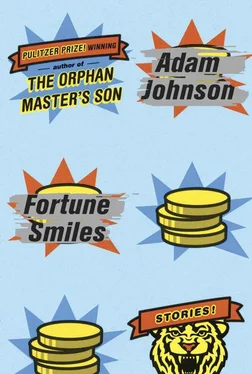“Allow me,” I say. With a passkey, I open the door.
We regard a high-backed chair, a large desk and a little stool.
When a boy moves to enter, Berta stops him. “The tour does not go here,” she says.
“This looks like a place for conversation,” I say. “Not for torture.”
Berta looks nervously at the stool. “This part of the tour is over,” she says.
I appeal to the students. “How can talking be torture?”
Berta stares vacantly into the room. “When you haven’t slept for days,” she says, her voice subdued. “When they question you in shifts, saying you’ll never see your family again, saying your father has lost his job and your sister was removed from college. When they tell you your husband is dead from his wounds, even though he lives, even though he’s in the same prison with you for two years and you don’t even know it. When they show you your death certificate, all filled out except for the date, and they do you the courtesy of asking your preference for the day you wish to expire. When you finally say you’ll confess to whatever they like, and instead, they send you down to the U-boat.”
Berta wipes her eyes and heads alone down the hall.
The students eye one another with uncertainty.
We follow Berta. I admit that no person should be shown her own death certificate. And no wife should be separated from her husband. Yes, the woman was a subversive criminal, but that doesn’t mean I don’t sympathize with what she endured in the wake of her defiance. However, when we catch up to her, the sadness in her eyes disappears. She enters high gear again, walking backward, citing various studies about torturers and victims. Then she goes into talk-show mode about mercy and empathy, throwing in a couple of public-service announcements on the topic of humanity. Passing the control rooms, she minimizes the inmates’ crimes, insinuating that they were incarcerated for reading banned poetry, attending protest concerts and listening to Wessi radio broadcasts.
In the housing unit, Berta directs us to housing cell 124, which is standing open.
“I was 124,” she says. “For two years, that was my only name. And this cage was my home.” She does not enter, and neither do we. From a distance, she points out the reinforced door, the peephole, the muck-tray slot, the dripping ceiling and the wooden bunk. “You had to sleep on your back all night, spread-eagle,” she tells the students. “All night the guards looked through the peephole, and if you were not sleeping in the proper position — punishment.”
“What kind of punishment?” Katja asks.
“It varied over time,” Berta tells her. “It could be as simple as your toilet privileges being revoked, which meant doing your business in a bucket. When I first arrived, it was gynecological exams.”
“Please,” I announce. “There was no such thing. There were rules to be followed. A guard would have been written up for such an infraction.”
Berta ignores me, answering only the student. “A battery of female exams,” she says. “Each day for my first three weeks. Twenty-one sessions with the speculum.”
Katja crosses herself.
“This is a fabrication,” I say. “Dr. Werner would never have submitted to this.”
To the students, Berta says, “When we visit the U-boat, you will see there were worse punishments.”
“The U-boat was never punishment,” I say. “It was part of the interview regimen.”
Berta ignores me. “Now to the medical wing,” she says. “Where you can judge for yourself the nature of the health care.”
I hold up my ticket stub. “I have paid my money,” I say. “I am on this tour as well.”
“Yes,” Berta says, “and the tour is moving on.”
“But we’re not done here,” I say, and step inside cell 124. “This is not so bad,” I announce. “There are smaller rooms in the world. A person could stretch out here, even do some exercises.”
“This feels roomy to you?” Berta asks.
“It is not the Kempinski Hotel,” I say. “But it’s certainly no cage.”
“Have you felt the room this way?” Berta asks, and closes the door on me.
I hear it lock. When I try to open the door, there is no handle or mechanism to grab.
“What’s the meaning of this?” I ask.
“Does the room still feel large?” Berta’s voice is faint through the thick metal.
It is a strange experience to reach for a door and find nothing to grasp. I run my hands along the metal, but without any purchase, I can find no way to even rattle it.
I speak into the door. “Okay, you have made your point.”
“Did I?” she asks. “Does the room feel different?”
I look over my shoulder at the wooden bunk and moldy concrete walls, at the open-throated cast-iron toilet. “The room is the same,” I say. “Now open the door.”
She does not answer.
I say, “If you will now open the door, please.”
There is no response. I place my ear to the metal but hear nothing.
“Hello,” I call. “Are you still there?”
“I know who you are,” Berta says. “I remember you.”
Now I’m the one who’s silent.
“Do you recognize me?” she asks.
“This is not part of the tour,” I call out. “I would like the door opened.”
“I cannot open the door,” she says. “I do not have a key.”
I lower myself to my knees and look out through the muck-tray slot. I see the students’ athletic shoes and Berta’s ankles below the hem of her dress. She has a small tattoo of a butterfly. I reach through the slot and extend the ring of master keys. I hold them out for a long time, but they are not taken.
“First,” says Berta, “I must know if you remember.”
“I do not need to recall the past,” I say. “I am certain of what it was.”
“If this place was so innocent,” she says, “how come they closed it down?”
“If this place was so horrible,” I ask my guide, “how come you keep returning?”
“Part of my identity was stolen from me,” she says. “I’m trying to get it back.”
I have a good comeback line for this, but I will save it for the red letters on my video.
“This is not legal,” I tell her. “I am not a criminal. You can’t treat me like one.”
The keys are taken from my hand. One thing about these cells is that the light switches are on the outside. I’m reminded of this when everything goes dark. Then I hear the footsteps of everyone walking away. I don’t bother to bang and shout. Berta won’t get that satisfaction from me. I stand and put my hand out into the dark. Even though I have these rooms memorized, I trip on something and almost go down. At last I find the wooden bunk. My video glasses are filming this black moment, but I don’t know how to turn them off. How did this come to pass? What parade of indignities led to being locked alone in my own prison?
What I think about is Gitte’s father, who somehow knew that his family was soon to be torn apart, and during one of their last beautiful moments together, he decided to take action. I wonder which moment was ours. I scan all the holidays and school events for such a time.
A family outing comes to me. We took our little blue Trabant up the hills and into the columbines overlooking Cottbus. Gitte had an old Praktica she wanted to test. Driving along, I pointed out many picnic spots. She rejected them all. Finally, she picked a location littered with trash and old tires. But when we parked and got out, I saw how the light fell through the trees, how if you faced just right, the backdrop was a wall of dappled granite. Gitte positioned her tripod and set the camera’s timer. Then the three of us raced to pose upon a fallen log. I adjusted my epaulettes, Gitte teased her hair, Nina balanced on both our knees. The timer ticked. We stretched wide our camera smiles. We smiled and waited, the timer ticking. We looked at each other with our overwide smiles and rolled our eyes, and still the timer ticked. It was Nina who started laughing at how ridiculous we looked, and soon all of us were truly laughing. The timer never did go off, which made it all the more funny, and the picture was never taken. But this was the moment. Nina bouncing upon the two of us. Gitte, head back with laughter. Me in the middle of it all. This was the time to take up the brick, to raise it high and swing with everything into the face of the bomb.
Читать дальше












